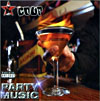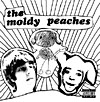
This Week: Retro country-rock, revolutionary dancing music, and profane pop.
The Beachwood Sparks
Once We Were Trees (Sub Pop)

The photo of the Beachwood Sparks inside cover of their second CD, Once We Were Trees, shows the four band members against a painted backdrop of autumn foliage, all dressed like Gram Parsons in country-western thrift-store shirts and hip-hugger jeans. It's not a bad image; but on the record they do little more than channel the ghosts of late-'60s psychedelic country-folk without offering much in the way of an original vision on how that music can work in a whole new world.
The resurrection of the sounds of the late '60s is often eerie: "The Sun Surrounds Me" and "You Take the Gold" could be outtakes from the Byrds' Sweetheart of the Rodeo, and "Juggler's Revenge," with a guest performance by former Dinosaur Jr. guitarist J. Mascis, sounds like a long-lost track from the Allman Brothers. On "Hearts Mend," laced with a mournful harmonica, the band captures Harvest-era Neil Young. Throw in a couple of upbeat numbers that sound like the Grateful Dead at their roguish early-'70s best, and the Beachwood Sparks have covered an entire era.
The reproductions are dead on; there are even some great songs among them, particularly "You Take the Gold" and "Yer Selfish Ways." The Beachwood Sparks are a talented band, and the heady, atmospheric (and uncredited) production is top-notch. It's just too bad that they spent so much time and money on verisimilitude and so little effort on making music that's relevant.
—Matthew T. Everett
The Coup
Party Music (75Ark)

One of the great promises, hopes and threats of hip hop was the possibility that it could spark revolution, whether it be social, economic or political. It came closest in the late '80s and early '90s in the voice of Public Enemy's Chuck D. But soon after, rappers began mimicking the violent posturing, without having a hell of a lot to say or an interesting way to say it.
Gangsta rap finally seems to have run its course, and there's a new breed of thoughtful rappers. The Coup is the most political of the lot, and in many ways is anti-gangsta. With songs like "5 Million Ways to Kill A C.E.O.," The Coup certainly isn't pacifist. But unlike much of the rap coming out of the '90s, they glamorize the poor and demonize the rich—their logo is a black woman nursing a baby while carrying a sawed-off shotgun over her shoulder.
On Party Music, their third release (which was heading to the presses before September 11 with a cover image of the World Trade Center exploding), The Coup turn dichotomous sloganeering into high art. On the opening track, "Everythang," MC Boots Riley starts with simplistic lines like "Every cop is a corrupt one," but moves onto the more complex "Every truth ain't evident/ Every slave story present tense/ Every uprise a consequence/ Every time it be something' sweet/ Every banker is a fuckin' thief/ Everybody better holler with me."
Combining both samples and live instrumentation, The Coup (with Pam the Funkstress on turntables) creates a blend of funky R&B that despite its strong politics never forgets that music's main purpose is to make you move. Better yet, the politics don't collapse under pedantic sentiment—Boots' lyrics are mostly funny lines like "I write my lyrics on parking tickets." Plenty of people will squirm at militant lines like "If you got beef with c-o-ps/ throw a molotov at the p-i-gs." But the groove throughout these songs is so strong that to take the lyrics literally would miss the message. As the anarchist Emma Goldman said nearly a century ago, "If I can't dance, I want no part of your revolution." Well, you can dance to The Coup.
—Joe Tarr
The Moldy Peaches
The Moldy Peaches (Rough Trade/Sanctuary)

This isn't exactly a new album—it came out earlier this year. But The Moldy Peaches are one of two great male-female duos making the rounds these days, the other being Detroit's White Stripes. But unlike the Stripes, who are dominated by singer-songwriter-guitarist Jack White, the Peaches are a partnership of equals. Adam Green and Kimya Dawson both sing—often at the same time, although only occasionally the same words. They trade off between Dawson's laconic but sincere murmur and Green's sardonic sneer, taking in everything from Duran Duran crushes to breakfast cereal metaphors ("I feel like I'm chasing the guy from Lucky Charms").
The songs (19 of them in 46 minutes) are almost uniformly fine, miniature pop gems put across with minimal instrumentation and deceptive indifference. They want it to seem like they just kind of invented them on the spot, and in some cases it's not hard to believe. But the off-hand lyricism of songs like "Jorge Regula," "Nothing Came Out" and "The Ballad of Helen Keller & Rip Van Winkle" belie the Peaches' surface snideness. Not that they aren't funny—"Downloading Porn with Davo," the fuzztone rave-up of "Little Bunny Foo-Foo," and "Who's Got the Crack?" all work as both one-liners and gleeful rock 'n' roll. "There's no such thing as a harmless joke," they warn, and they may be right. But even with their playground profanity and general incorrectness ("Who'm I gonna stick my dick in?" Green asks at one point), it's hard to believe The Moldy Peaches have any ill intentions.
—Jesse Fox Mayshark

November 29, 2001 * Vol. 11, No. 48
© 2001 Metro Pulse
|